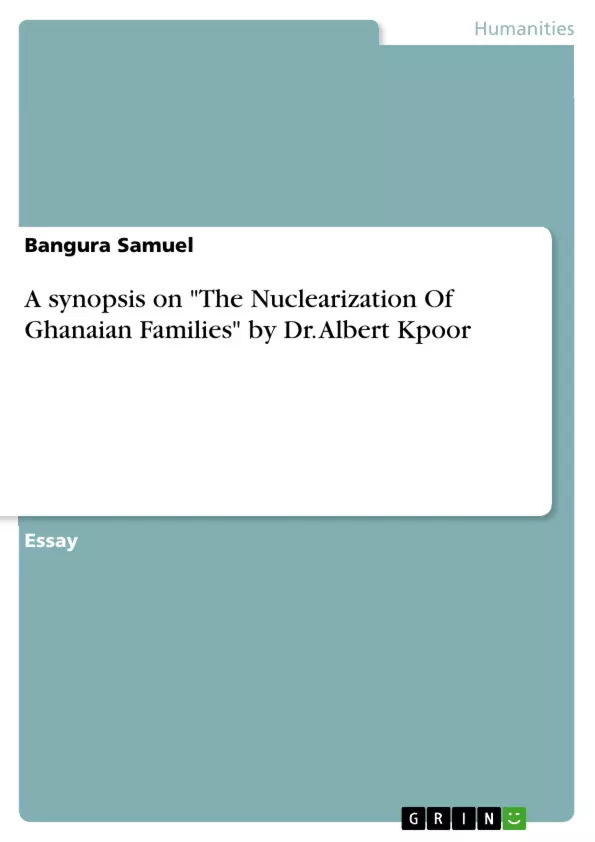The nuclearization of the Ghanaian family represents a significant sociocultural shift with transformative implications for familial structures and dynamics. This study delves into the evolving nature of family units in Ghana, emphasizing the gradual transition from extended to nuclear family setups. Key areas of exploration include the influence of urbanization, socioeconomic factors, and changing cultural norms on the restructuring of family units.
The study aims to unravel the dynamics of intergenerational relationships, gender roles, and the redefinition of familial responsibilities within the nuclearized context. Additionally, the impact of globalization and modernization on the Ghanaian family structure will be critically assessed. The implications of the nuclearization trend on social cohesion, support systems, and the well-being of family members will be scrutinized. Attention will be given to both positive outcomes, such as increased autonomy and flexibility, and potential challenges, including the strain on traditional support networks and caregiving responsibilities.
The author argues that the decline of the extended family structure is underpinned by certain factors, resulting in some consequences on the family life in Ghana.
There are several factors that have led to the family nuclearization in Ghana, or the diminishing structure of the Ghanaian extended family.
Inhaltsverzeichnis (Table of Contents)
- Commercialization
- Migration
- Urbanization
- The Spread of Education
- The Spread of Religion
- Legal changes
Zielsetzung und Themenschwerpunkte (Objectives and Key Themes)
This article aims to explore the phenomenon of nuclearization within Ghanaian families, investigating the factors driving this shift and its subsequent consequences. The author delves into the historical and societal context of this transformation.
- The decline of the extended family structure in Ghana
- The impact of commercialization and industrialization
- The role of migration and urbanization in shaping family dynamics
- The influence of education and religious changes on family values
- The legal frameworks impacting inheritance and family structures
Zusammenfassung der Kapitel (Chapter Summaries)
The article examines the historical context of Ghanaian family structures and the factors that have contributed to the decline of the extended family system. It explores the impact of commercialization and industrialization, tracing the emergence of a more individualistic society and the subsequent decline of the communal nature of the extended family. The author further analyzes the role of migration and urbanization in shaping family dynamics. The migration of individuals from rural areas to urban centers is discussed in terms of its economic drivers, social implications, and impact on family ties. The influence of education and religious changes on Ghanaian family values is also examined, highlighting how education has fostered a shift towards western lifestyles and the adoption of nuclear family structures. Finally, the author explores the influence of legal changes, specifically the Intestate Succession Law of 1985, on the distribution of inheritance and its impact on family dynamics.
Schlüsselwörter (Keywords)
The primary keywords and focus topics of this article include nuclearization of the family, extended family structure, commercialization, migration, urbanization, education, religion, legal changes, Ghana, and traditional family values. These terms collectively encompass the key themes and concepts explored in the article, highlighting the socio-economic and cultural factors influencing family structures in Ghana.
- Quote paper
- Bangura Samuel (Author), 2023, A synopsis on "The Nuclearization Of Ghanaian Families" by Dr. Albert Kpoor, Munich, GRIN Verlag, https://www.grin.com/document/1435709



